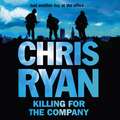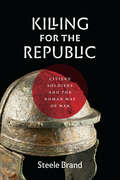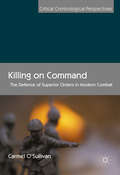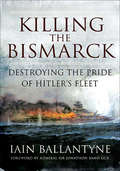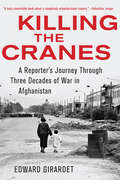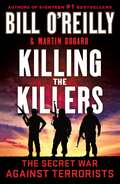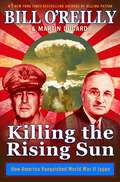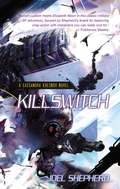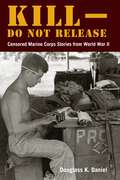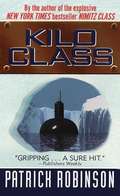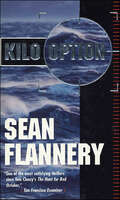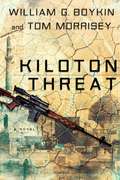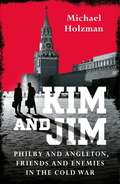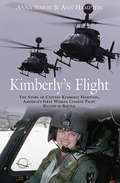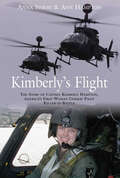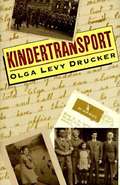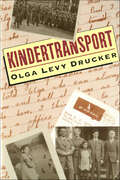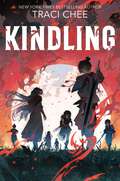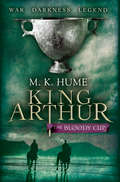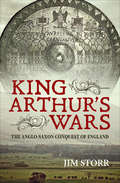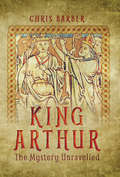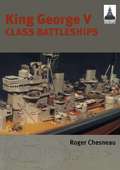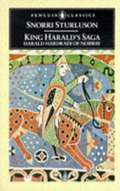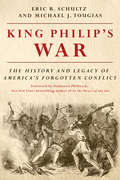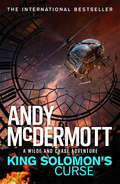- Table View
- List View
Killing for the Company: Just another day at the office...
by Chris RyanFormer SAS legend Chris Ryan brings you his sixteenth novel and it is full of all his trademark action, thrills and inside knowledge. 2003. Invalided out of the SAS Chet Freeman makes his living in high-end security, on a temporary contract for an American corporation called the Grosvenor Group. He catches a young woman, a peace campaigner, eavesdropping on a meeting the Group is holding with the British Prime Minister. The Group's interests include arms manufacture, and what Chet and the young woman overhear seems to imply that it is bribing the Prime Minister to take his country into an illegal war. Could this possibly be true?Somebody believes that this is a secret that needs covering up, because Chet and the girl are attacked. Hunted down, they go into hiding, and a deadly game of cat and mouse begins.Nearly ten years later tension is reaching breaking point in Jerusalem. The now ex-Prime Minister is working as a Middle East peace envoy. As the city descends into anarchy and rival armies are poised to turn it into a battlefield, Chet's best buddy, Luke, is part of a team tasked by the Regiment with extracting the ex-Prime Minister.At the height of the battle Luke discovers a conspiracy far more devastating than any arms deal.(P)2011 Hodder & Stoughton Limited
Killing for the Republic: Citizen-Soldiers and the Roman Way of War
by Steele BrandHow Rome's citizen-soldiers conquered the world—and why this militaristic ideal still has a place in America today."For who is so worthless or indolent as not to wish to know by what means and under what system of polity the Romans... succeeded in subjecting nearly the whole inhabited world to their sole government—a thing unique in history?"—PolybiusThe year 146 BC marked the brutal end to the Roman Republic's 118-year struggle for the western Mediterranean. Breaching the walls of their great enemy, Carthage, Roman troops slaughtered countless citizens, enslaved those who survived, and leveled the 700-year-old city. That same year in the east, Rome destroyed Corinth and subdued Greece. Over little more than a century, Rome's triumphant armies of citizen-soldiers had shocked the world by conquering all of its neighbors. How did armies made up of citizen-soldiers manage to pull off such a major triumph? And what made the republic so powerful? In Killing for the Republic, Steele Brand explains how Rome transformed average farmers into ambitious killers capable of conquering the entire Mediterranean. Rome instilled something violent and vicious in its soldiers, making them more effective than other empire builders. Unlike the Assyrians, Persians, and Macedonians, it fought with part-timers. Examining the relationship between the republican spirit and the citizen-soldier, Brand argues that Roman republican values and institutions prepared common men for the rigors and horrors of war. Brand reconstructs five separate battles—representative moments in Rome's constitutional and cultural evolution that saw its citizen-soldiers encounter the best warriors of the day, from marauding Gauls and the Alps-crossing Hannibal to the heirs of Alexander the Great. A sweeping political and cultural history, Killing for the Republic closes with a compelling argument in favor of resurrecting the citizen-soldier ideal in modern America.
Killing on Command
by Carmel O'SullivanThis book explores the unique social and environmental factors which influence soldiers to commit war crimes. With a focus on decision-making processes, this monograph provides a significant interdisciplinary analysis of how soldiers decide to follow the commands of their superior officers, even if that means acting illegally. Making the key distinction between normal civilian society and the shocking realities of war, the author facilitates the reader with a comprehensive understanding of what a front-line soldier faces in contemporary combat situations. Killing on Command presents the limits of the law in preventing the occurrence of war crimes. Realistic and practical measures for armed conflict, including the regulation and prevention of violence, and the just implementation of legal standards are all questioned and examined in depth. Given a current focus on the regulation of conduct in war, and the recent prosecution of soldiers, this book will be of particular interest to scholars in the fields of criminology and international relations, as well as policy-makers.
Killing the Bismarck: Destroying the Pride of Hitler's Fleet
by Iain Ballantyne&“An excellent account . . . A suspenseful narrative that will keep readers on the edge of their seats.&” —WWII History Magazine In May 1941, the German battleship Bismarck, accompanied by heavy cruiser Prinz Eugen, broke out into the Atlantic to attack Allied shipping. The Royal Navy&’s pursuit and subsequent destruction of Bismarck was an epic of naval warfare. In this new account of those dramatic events at the height of the Second World War, Iain Ballantyne draws extensively on the graphic eyewitness testimony of veterans, to construct a thrilling story, mainly from the point of view of the British battleships, cruisers, and destroyers involved. He describes the tense atmosphere as cruisers play a lethal cat and mouse game, shadowing Bismarck in the icy Denmark Strait. We witness the shocking destruction of the British battle cruiser Hood, in which all but three of her ship&’s complement were killed—an event that filled pursuing Royal Navy warships, including the battered battleship Prince of Wales, with a thirst for revenge. While Swordfish torpedo-bombers try desperately to cripple the Bismarck, we sail in destroyers on their own daring torpedo attacks, battling mountainous seas. Finally, the author takes us into the final showdown, as battleships Rodney and King George V, supported by cruisers Norfolk and Dorsetshire, destroy the pride of Hitler&’s fleet. This vivid, superbly researched account portrays this epic saga through the eyes of so-called &“ordinary sailors&” caught up in extraordinary events—conveying the horror and majesty of war at sea in all its cold brutality and awesome power.
Killing the Cranes
by Edward GirardetEdward Girardet has been a foreign correspondent covering Afghanistan since the late 1970s when the Soviets launched their abortive campaign into the region. He has worked with such news organizations as the Christian Science Monitor and US News and World Report. In this book, he describes his experience of Afghanistan ranging from walking with powerful personalities, such as Osama bin Laden and Amed Shah Massoud, to following Afghan guerillas in the mountains. He also describes how corruption among wealthy Afghan leaders has worsened under Western occupations which have shown little sense of how to empower the people. Written for a general audience, Girardet's journalistic narrative is frank though eloquent. His epilogue synthesizes his experiences and offers considerations for moving forward in the region. A comprehensive index, glossary of terms and names, and a time-line make it useful for historical research. Annotation ©2011 Book News, Inc. , Portland, OR (booknews. com)
Killing the Killers: The Secret War Against Terrorists (Bill O'Reilly's Killing Series)
by Bill O'Reilly Martin DugardInstant #1 New York Times bestseller!In the eleventh book in the multimillion-selling Killing series, Bill O’Reilly and Martin Dugard reveal the startling, dramatic story of the global war against terrorists.In Killing The Killers, #1 bestselling authors Bill O'Reilly and Martin Dugard take readers deep inside the global war on terror, which began more than twenty years ago on September 11, 2001.As the World Trade Center buildings collapsed, the Pentagon burned, and a small group of passengers fought desperately to stop a third plane from completing its deadly flight plan, America went on war footing. Killing The Killers narrates America's intense global war against extremists who planned and executed not only the 9/11 attacks, but hundreds of others in America and around the world, and who eventually destroyed entire nations in their relentless quest for power.Killing The Killers moves from Afghanistan to Iraq, Iran to Yemen, Syria, and Libya, and elsewhere, as the United States fought Al Qaeda, ISIS, and the Iranian Revolutionary Guard, as well as individually targeting the most notorious leaders of these groups. With fresh detail and deeply-sourced information, O'Reilly and Dugard create an unstoppable account of the most important war of our era.Killing The Killers is the most thrilling and suspenseful book in the #1 bestselling series of popular history books (over 18 million sold) in the world.
Killing the Rising Sun: How America Vanquished World War II Japan
by Bill O'Reilly Martin DugardThe powerful and riveting new book in the multimillion-selling Killing series by Bill O’Reilly and Martin Dugard<P><P> Autumn 1944. World War II is nearly over in Europe but is escalating in the Pacific, where American soldiers face an opponent who will go to any length to avoid defeat. The Japanese army follows the samurai code of Bushido, stipulating that surrender is a form of dishonor. Killing the Rising Sun takes readers to the bloody tropical-island battlefields of Peleliu and Iwo Jima and to the embattled Philippines, where General Douglas MacArthur has made a triumphant return and is plotting a full-scale invasion of Japan.<P> Across the globe in Los Alamos, New Mexico, Dr. J. Robert Oppenheimer and his team of scientists are preparing to test the deadliest weapon known to mankind. In Washington, DC, FDR dies in office and Harry Truman ascends to the presidency, only to face the most important political decision in history: whether to use that weapon. And in Tokyo, Emperor Hirohito, who is considered a deity by his subjects, refuses to surrender, despite a massive and mounting death toll. Told in the same page-turning style of Killing Lincoln, Killing Kennedy, Killing Jesus, Killing Patton, and Killing Reagan, this epic saga details the final moments of World War II like never before. <P><b>A New York Times Bestseller</b>
Killswitch: A Cassandra Kresnov Novel (Cassandra Kresnov #3)
by Joel ShepherdTwo years after the unhatching of Callayan President Neiland's plot to make the capital city of Tanusha the center of the Federation, Callay is under siege. So begins the third installment of this gripping trilogy from an exciting new sci-fi author.A powerful faction of conservative Fleet captains has surrounded Callay, at Earth's behest, and is threatening a blockade - or worse. A fearful Earth does not wish to lose direct control of its precious war machine, and there are fears of civil war.All that Callay has to oppose the warships of the Fleet is the Callayan Defense Force (CDF) - a newly formed group of raw recruits led by a politically hamstrung general. However, the CDF is largely trained and organized by Major Vanessa Rice and her best friend, Callay's combat-android, Commander Cassandra Kresnov. But when Cassandra's lover, Special Agent Ari Ruben, discovers a plot to kill her using a killswitch, which her old masters in the League built into her brainstem, Sandy is forced to go underground to stay alive.
Kill–Do Not Release: Censored Marine Corps Stories from World War II (World War II: The Global, Human, and Ethical Dimension)
by Douglass K. Daniel“Fighter-Writer” reports from major battles in the Pacific highlight what America’s Marines endured in World War IIDouglass K. Daniel presents a fascinating trove of previously classified material withheld from the public because of government and public relations concerns at the time, including tactical details that could inadvertently aid the enemy, battlefield gore that could disturb readers, and the gamut of issues of taste. Navy censors in the field and editors at Marine Corps headquarters in Washington were also on alert for any material that could negatively affect the Corps itself or the overall war effort. Soul-searching stories that questioned the nature of war were rejected lest they sow doubt stateside about the cause for which so many lives were being lost.Behind the bylines was a new breed of storytellers. Considered “fighter-writers,” Marine combat correspondents, or CCs, carried typewriters as well as weapons. The Marine Corps Division of Public Relations recruited them from America’s newsrooms to join the fight that stretched from Guadalcanal and the bloody assault on Tarawa to the black sands of Iwo Jima and the dense jungles of Okinawa. Their approved work appeared in civilian newspapers, magazines, and other national and local media.This collection also highlights the unique efforts of the CCs and the public relations officers who commanded them. While they were assigned to report and write, they were Marines first. They eagerly put aside their notebooks to take up arms against the enemy as needed. Many were wounded in battle, and more than a dozen were killed, giving their lives to get the story behind the most significant conflict in human history.
Kilo Class (Arnold Morgan #2)
by Patrick RobinsonIt's one of the stealthiest, most dangerous underwater warships ever built.and it's about to set off World War III. Silent at less than five knots and capable of a massive nuclear warhead punch, it's the 240-foot Russian Kilo Class submarine. Strapped for hard cash, the Russians have produced ten new Kilos for Beijing. The Chinese have already received three of the subs and now the last seven are ready to be delivered-a code-red situation the Pentagon must avert. Armed with a full strike force of Kilos, China can cripple American interests, shatter the balance of power, and successfully achieve the unthinkable in the Pacific Rim. But not if the newly appointed National Security Adviser, wily Texas admiral Arnold Morgan, can stop them-using the navy's deadliest covert forces. In a breathtaking race against time, a team of Navy SEALs penetrates deep inside the remote waters of northern Russia on a daring mission of destruction. And in the icy darkness of the North Atlantic, a brave U.S. captain takes his 7,000-ton nuclear vessel on a hair-raising trip beneath the polar ice cap to head off a powerful Russian cordon determined to transport the Kilos at any cost. Horns locked in a tense game of geomilitary survival, each of the world' three most powerful nations knows that one mistake will mean all-out war.
Kilo Option (Bill Lane)
by Sean FlanneryMilitary intelligence analyst Bill Lane, the dauntless hero of Winner Take All, is about to find out. When the national Security Agency assigns him to investigate a mysterious commando raid on Iran's Persian Gulf submarine installation, where for Russian-built Kilo class subs are known to be based, Lane fears the worst--that nuclear technology has finally fallen into the hands of terrorists.At the Publisher's request, this title is being sold without Digital Rights Management Software (DRM) applied.
Kiloton Threat (Blake Kershaw Series #2)
by William G. Boykin Tom MorriseyTaken from what could be tomorrow's headlines,Kiloton Threat is a novel that explores the frightening potential of nuclear weapons in the Middle East today. Out of the house churches of rural Iran, a Christian masquerading as a Muslim gains the confidence of a high-ranking leader in the Iranian nuclear program and opens his eyes to Christianity. The man's newfound faith stirs his desire to flee to the West, taking with him intelligence that would allow Coalition forces to neutralize his nation's devastating capabilities. But no one in such a position could ever escape unnoticed. Enter Blake Kershaw, a highly trained U. S. Special Forces officer who has already made extraordinary sacrifices for his country that include faking death and losing his true identity. His mission to infiltrate Iran and extract the high-value defector strains the relationship with the woman he loves-- one of the few people on earth who knows his real story. With even more intensity, it shows the price that must sometimes be paid when political correctness fails and a man has to stand up for what is right.
Kim and Jim: Philby And Angleton, Friends And Enemies In The Cold War
by Michael HolzmanKim Philby’s life and career has inspired an entire literary genre: the spy novel of betrayal. He was one of the leaders of the British counter-intelligence efforts, first against the Nazis, then against the Soviet Union. He was also the KGB’s most valuable double-agent, so highly regarded that today his image is on the postage stamps of the Russian Federation.
Kimberly's Flight
by Ann Hampton Anna SimonUS Army Captain Kimberly N. Hampton was living her dream: flying armed helicopters in combat and commanding D Troop, 1st Squadron, 17th Cavalry, the armed reconnaissance aviation squadron of the 82nd Airborne Division. An all-American girl from a small Southern mill town, Hampton was a top scholar, student body president, ROTC battalion commander, and highly ranked college tennis player. In 1998, she was commissioned as a second lieutenant in the army. Driven by determination and ambition, Hampton rapidly rose through the ranks in the almost all-male bastion of military aviation to command a combat aviation troop. On January 2, 2004, Captain Hampton was flying an OH-58D Kiowa Warrior helicopter above Fallujah, Iraq, in support of a raid on an illicit weapons marketplace, searching for an elusive sniper on the rooftops below. A little past noon, her helicopter was wracked by an explosion. A heat-seeking surface-to-air missile had knocked off the helicopter's tail boom. The helicopter crashed, killing Hampton. Kimberly's Flight is the story of Captain Hampton's exemplary life. This story is told through nearly fifty interviews and her own e-mails to family and friends, and is entwined with her mother's narrative of loving and losing a child.
Kimberly's Flight: The Story of Captain Kimberly Hampton, America's First Woman Combat Pilot Killed in Battle
by Ann Hampton Anna Simon“The story of an outstanding young woman who realized her ambition to rise in military, fly helicopters and lead soldiers into combat.” —Independent MailU.S. Army Captain Kimberly N. Hampton was living her dream: flying armed helicopters in combat and commanding D Troop, 1st Squadron, 17th Cavalry, the armed reconnaissance aviation squadron of the 82nd Airborne Division. An all-American girl from a small southern mill town, Kimberly was a top scholar, student body president, ROTC battalion commander, and highly ranked college tennis player. In 1998 she was commissioned as a second lieutenant in the Army. Then, driven by determination and ambition, Kimberly rapidly rose through the ranks in the almost all-male bastion of military aviation to command a combat aviation troop. On January 2, 2004, Captain Hampton was flying an OH-58D Kiowa Warrior helicopter above Fallujah, Iraq, in support of a raid on an illicit weapons marketplace, searching for an illusive sniper on the rooftops of the city. A little past noon her helicopter was wracked by an explosion. A heat-seeking surface-to-air missile had gone into the exhaust and knocked off the helicopter’s tail boom. The helicopter crashed, killing Kimberly. Kimberly’s Flight is the story of Captain Hampton’s exemplary life. This story is told through nearly fifty interviews and her own e-mails to family and friends, and is entwined with Ann Hampton’s narrative of loving and losing a child. “This inspiring story of self discipline, leadership, patriotism and sacrifice should be required reading for a country far removed from the concept of total war. Even the war’s staunchest critics will enjoy this unromanticized picture of heroism.” —On Point: The Journal of Army History
Kindertransport
by Olga Levy DruckerThe author describes the circumstances in Germany after Hitler came to power that led to the evacuation of many Jewish children to England and her experiences as a young girl in England during World War II.
Kindertransport
by Olga Levy DruckerMama and I climbed aboard. I waved to Papa until he was only a tiny speck in the distance. The train turned the curve, and he was gone.The powerful autobiographical account of a young girls' struggle as a Jewish refugee in England from 1939–1945.
Kindling
by Traci CheeFrom bestselling and award-winning author Traci Chee comes a standalone fantasy set against a war-ravaged world where kindling warfare—the use of elite, magic-wielding teenage soldiers—has been outlawed. In this rich and evocative novel, seven kindlings search for purpose and identity as they prepare for one final battle. For fans of the classic films Seven Samurai and The Magnificent Seven.Once, the war was fought with kindlings—elite, magic-wielding warriors whose devastating power comes at the cost of their own young lives.Now the war is over, and kindlings have been cast adrift—their magic outlawed, their skills outdated, their formidable balar weapons prized only as relics and souvenirs.Violence still plagues the countryside, and memories haunt those who remain. When a village comes under threat of siege, it offers an opportunity for seven kindlings to fight one last time. But war changed these warriors. And to reclaim who they once were, they will have to battle their pasts, their trauma, and their grim fates to come together again—or none of them will make it out alive.From bestselling and award-winning author Traci Chee comes a gut-wrenching, introspective fantasy about seven lost soldiers searching for the peace they once fought for and the future in which they’re finally daring to believe.
King Arthur (King Arthur Trilogy 3): A thrilling historical adventure of treason and turmoil
by M. K. HumeWar. Darkness. Legend. King Artor, now an aging monarch, is under threat yet again, facing both physical and emotional battles in the culmination of M.K. Hume's King Arthur trilogy. Perfect for fans of James Wilde and Ben Kane.'Hume brings the bloody, violent, conniving world vividly to life...will appeal to those who thrill to Game of Thrones and other tales of intersecting, ever-warring, noble lineages' - Kirkus ReviewFor many years, the people of Briton have enjoyed peace and prosperity under the reign of King Artor and the Union of Kings. Having spurned the despotism of his predecessor, Uther Pendragon, Arthur has ruled with a strong sense of duty, goodness and honour.Artor is now weakening with age, however, and the seeds of discontent are being sown. Seeking to cleanse the land of Christian belief, dissenters need a symbol with which to legitimise their pagan claim and gather malcontents together into a cohesive weapon. These shadowy, subversive elements seize upon the ancient cup of Bishop Lucius of Glastonbury as a way of fragmenting Artor's hard-fought-for kingdom. But first, they must lay their hands on the relic and, in doing so, unleash a force for evil from which murder and violent mayhem ensue.But it emerges that the ultimate threat to Artor's rule lies far closer to home; Artor is betrayed by kin. Celt will slay Celt and the river will run with blood.What readers are saying about King Arthur: The Bloody Cup: 'The tale is told in a very dedicated and passionate way by the author, and it pictures Celtic Britain in a most remarkable fashion. All the characters come vividly to life yet again in this heartfelt story while the atmosphere of the times really comes off the pages''A stunning finale full of action, intrigue, strong characterisation, bloodshed, treachery and passion'
King Arthur's Wars: The Anglo-Saxon Conquest of England
by Jim StorrThe story of an era shrouded in mystery, and the gradual changing of a nation&’s cultural identity. We speak English today, because the Anglo-Saxons took over most of post-Roman Britain. How did that happen? There is little evidence: not much archaeology, and even less written history. There is, however, a huge amount of speculation. King Arthur&’s Wars brings an entirely new approach to the subject—the answers are out there, in the British countryside, waiting to be found. Months of field work and map study allow us to understand, for the first time, how the Anglo-Saxons conquered England, county by county and decade by decade. King Arthur&’s Wars exposes what the landscape and the place names tell us. As a result, we can now know far more about this &“Dark Age.&” What is so special about Essex? Why is Buckinghamshire an odd shape? Why is the legend of King Arthur so special to us? Why don&’t Cumbrian farmers use English numbers when they count sheep? Why don&’t we know where Camelot was? Why did the Romano-British stop eating oysters? This book provides a new level of understanding of the centuries preceding the Norman Conquest.
King Arthur: The Mystery Unravelled
by Chris BarberThis book is the culmination of over thirty years of work and research by the author, who is a King Arthur specialist and bestseller.The book brings new information to light by examining through a jigsaw of connections throughout Dark Age Britain, especially Wales and Cornwall, as King Arthur is revealed to have been a hereditary King of the ancient land of the Silures in South Wales. In this way, Chris Barber has set out to reveal the true identity of King Arthur, whose identity has been obscured by the mists of time and the imaginative embellishments of romantic writers through the ages. After sorting fact from fiction, he not only identifies the Celtic prince who gave rise to the legend of Arthur, but reveals his family background, 6th century inscribed stones bearing his name and those of his contemporaries; locations of his courts, battle sites such as Badon Llongborth and Camlann; the identity of his enemies, the ancient Isle of Avalon and his final resting place.
King George V Class Battleships (ShipCraft #2)
by Roger ChesneauThe ShipCraft series provides in-depth information about building and modifying model kits of famous warship types. Lavishly illustrated, each book takes the modeller through a brief history of the subject class, highlighting differences between sister-ships and changes in their appearance over their careers. This includes paint schemes and camouflage, featuring colour profiles and highly-detailed line drawings and scale plans. The modelling section reviews the strengths and weaknesses of available kits, lists commercial accessory sets for super-detailing of the ships, and provides hints on modifying and improving the basic kit. This is followed by an extensive photographic gallery of selected high-quality models in a variety of scales, and the book concludes with a section on research references books, monographs, large-scale plans and relevant websites.The five battleships of the class covered by this volume were the most modern British capital ships to serve in the Second World War. They were involved in many famous actions including the sinking of both Bismarck and Scharnhorst, while Prince of Wales suffered the unfortunate distinction of being the first capital ship sunk at sea by air attack.
King Harald's Saga
by Magnus Magnusson Hermann PalssonThe story of King Harald (The Ruthless) of Norway, a contemporary of King Harold of England and William The Conqueror of Normandy. Harald attempted to claim for Norway the English throne and succeeded in marching to Chelsea before his army was defeated by English King Harold's troops and Harald was killed. Harold himself was defeated only nineteen days later by William of Normandy. Harald's demise though marked the end of the Viking era, of centuries of Scandinavian harrassment of England. Magnusson and Palsson wrote the introduction and translated the saga into English.
King Philip's War (Revised Edition): The History And Legacy Of America's Forgotten Conflict
by Michael J. Tougias Eric B. SchultzThe harrowing story of one of America's first and costliest wars—featuring a new foreword by bestselling author Nathaniel Philbrick At once an in-depth history of this pivotal war and a guide to the historical sites where the ambushes, raids, and battles took place, King Philip's War expands our understanding of American history and provides insight into the nature of colonial and ethnic wars in general. Through a careful reconstruction of events, first-person accounts, period illustrations, and maps, and by providing information on the exact locations of more than fifty battles, King Philip's War is useful as well as informative. Students of history, colonial war buffs, those interested in Native American history, and anyone who is curious about how this war affected a particular New England town, will find important insights into one of the most seminal events to shape the American mind and continent.
King Solomon's Curse (Wilde/Chase #13)
by Andy McDermottIn a gripping race against time, archaeologist Nina Wilde and ex-soldier Eddie Chase must find an immensely powerful weapon hidden in a lost African city. This explosive thriller is perfect for fans of James Rollins, Steve Berry, Matthew Reilly and Dan Brown.World-renowned archaeologist Nina Wilde is back on the hunt. Now a documentary presenter, Nina is in Jerusalem where clues found at the Ark of the Covenant recovery site have led her to the ruins of the First Temple, buried beneath Temple Mount. Within them, a hidden chamber conceals a map room - which contains a model of a mysterious city thought to hold a great yet deadly power hidden by King Solomon himself. Analysing the clues, Nina believes that the city is located in the Democratic Republic of Congo, one of the most dangerous locations on Earth. Her husband and ex-special forces soldier Eddie is in England but Nina's phone call is about to change everything. He has had his own problems in the DRC in the past and he isn't about to let Nina go there alone.Joining forces, Nina and Eddie are about to start a devastating chain of events which threatens the entire globe...Why readers are hooked on this KING Solomon's Curse:'One of the best authors that I have read' ***** Goodreads reviewer'Great characters, great action. This is definitely a 5 star' ***** Goodreads reviewer'Brilliantly crafted with great plots and imaginative scenarios...it leads to a gripping finale. Awesome read and I can't wait for the next one!' ***** Goodreads reviewer
